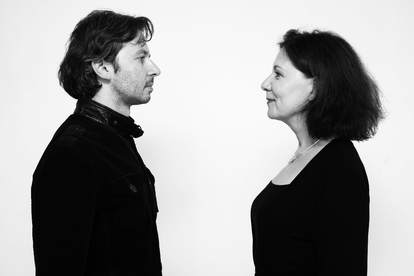
Taavi: We have been playing together for five years. So far it has been mainly a flute/piano duo. But now we added electronics too and it really does open up even more repertoire and challenges. The process with POLES started with a three-week rehearsal period in Morelia, Mexico where we were in residency in the electro-acoustic music centre CMMAS. The piece is an open score so you would imagine that reading it would not maybe be so difficult but in reality it is a truly difficult piece to perform. It is written in so called + - notation, a notation created by Stockhausen. To perform it you have to learn it from zero. It is really like learning a new language. You learn grammar, learn words, learn how to put together a sentence.
What is special about the Serge Modular Synthesizer?
Taavi: It is indeed a special instrument. The instrument comes from early 1970s, and by now it has gained a somewhat cult status. First of all, of course, because its beautiful profound sound that still amazes musicians, but also because of its very clever interface. As I see it, interfacing with electronic instruments is a very important part of music creation process. It is a West Coast style synth meaning that it is possible to redesign it in countless ways; you have to make it your own to make music with it and find your very own language to communicate with it. The very instrument's previous owner was Michael Manion, a late composer who used to work as an assistant for Karlheinz Stockhausen.
What was it like working with Stockhausen on the piece he wrote for you, Camilla?
Camilla: It was a complete surprise. I had won a prize in Rotterdam playing his In Freundschaft, which I had prepared with the help of Suzee Stephens and the late composer Michael Manion, and before I was to play it in Cologne, I went out to Kürten to play it for Stockhausen himself. I had of course analyzed every note and could play it perfectly from memory, and this somehow impressed him so much that he began then and there to start arranging AMOUR for me. Eventually I returned and lived for a week in a cabin on his ground while he continued to work. When we met for daily work sessions, he’d ask me about range or fingering or intervals and we would discuss phrasing and breathing. The original version was for clarinet (Suzee Stephens), and several things worked differently when transposed for flute. I remember being impressed not only with his exactness, but also in his desire to make it natural for the flute. He didn’t want to create “difficulties for difficulties sake.” I also experienced for the first time the luxury of being at a “retreat” — living in nature with no outside distractions and allowed to just practice and read (notably Satprem on Sri Aurobindo) and then to enjoy stimulating conversations with Karlheinz and Suzee at mealtimes. I also got to browse in his record library (which included a great LP-set of the history of folk to rock!)
How did your interactions with Stockhausen influence the creation and performance of this version of POLES?
Camilla: My interactions with Stockhausen included a wide range of activities, from attending rehearsals of music from Donnerstag aus LICHT (where I first met the whole Stockhausen clan) to working in his publishing company to learning other solo and chamber works. In the 80’s I attended every rehearsal and performance I could, later I participated in Montag in a studio part and then had a role on stage in 1993 for the opera Dienstag. Nothing he did was superfluous and this inspires us to respect all he has notated. At the same time, remembering him as a person, I remember him also as someone who could surprise with humor — and who introduced in his otherwise strictly formal compositions, the occasional “flowers for the ladies” (as he called a certain phrase in In Freundschaft) and who could also write “bagatelles” as gifts for friends (AMOUR). If I were to summarize the influence all these interactions with him in one word, I would choose “awareness.” He himself was always aware of so many things that were going on around him. He listened and watched very precisely and demanded from his musicians this as well: an extremely high level of awareness concerning not just the musical notes, but every aspect of the creative and re-creative process. This we are trying to carry on with our realization of POLES.


 RSS Feed
RSS Feed
